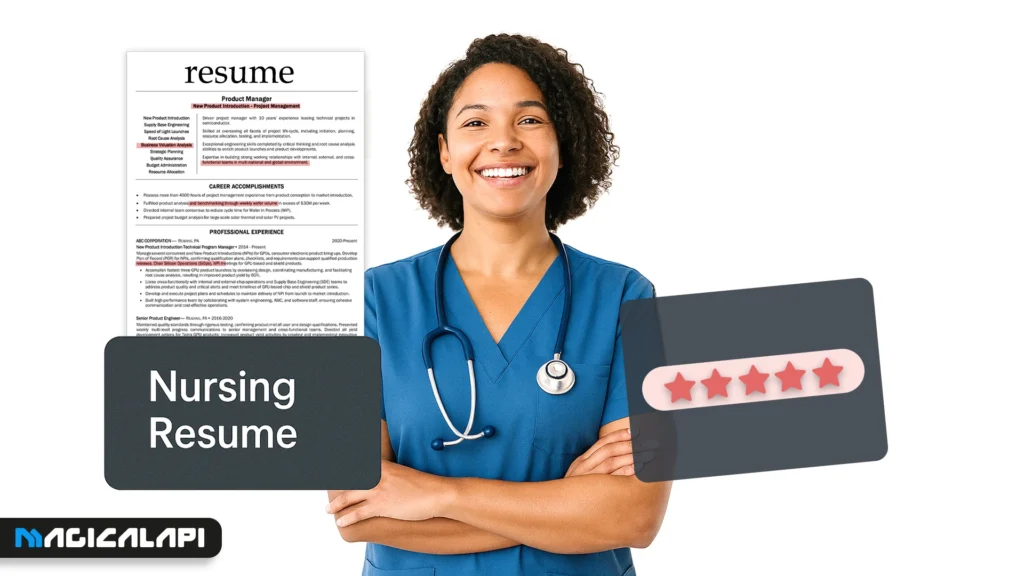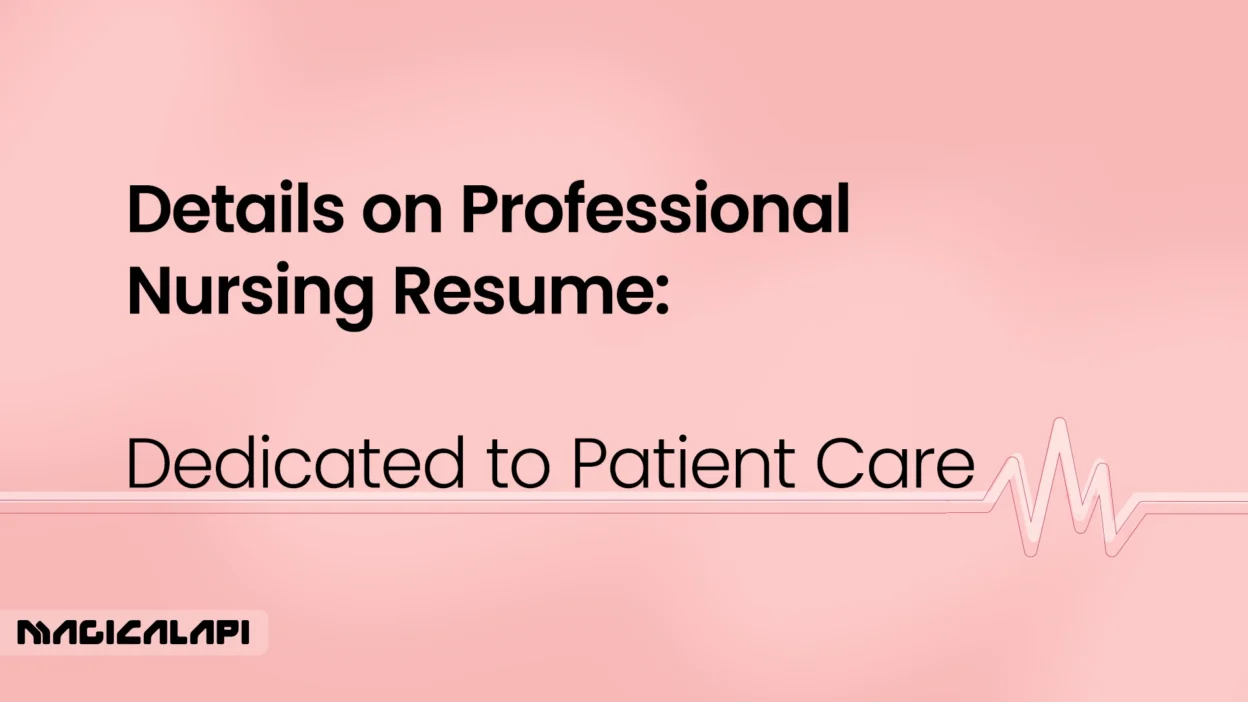When you’re discussing interviewing for that coveted healthcare position, your nursing resume is your first impression. It’s not a piece of paper, it’s a reflection of your patient care passion, your skill set, and your career path. Whether you’re a seasoned RN or a new graduate nurse who’s eager to enter the workforce, having a killer resume that will get you in the door in a very competitive industry can be your ticket. In this post, we’ll guide you through everything you need to make a professional, patient-centered resume that highlights your skills and enthusiasm. From templates to samples, you’re covered!
We’ll break it down step by step with actionable advice under every section so you can build a resume that hiring managers won’t be able to ignore.
Table of Contents
Nursing Resume Template
To begin with a great nursing resume template is to be like having your roadmap to success. A strong template allows for easy reading and showcases your strengths. The simple yet efficient formula to follow appears below:
- Header: Your complete name, telephone number, e-mail address, and, optional, your URL for LinkedIn page or professional portfolio.
- Professional Nursing Resume Summary: Short yet persuasive description of your qualifications and experience.
- Skills: Technical and soft nursing skills in a separate section.
- Work Experience: Reverse chronological work history of your nursing activities with responsibilities and achievements.
- Education & Certifications: Degrees, licensure, and certification like BLS or ACLS.
- Projects & Achievements: Distinguished contributions i.e., quality improvement projects.
- Additional Information: Volunteer experience, languages, or professional associations.
A nursing resume template takes the guesswork out of formatting, allowing you to focus on the information that will differentiate you. You can use free templates online or create your own to suit your own style—just make it clean and professional! And for extra confidence, be sure to validate it with a Resume checker before you hit send.
Professional Summary of Nursing Resume
Your professional Nursing Resume summary is your elevator pitch for your nursing resume. Be convincing in 3-5 sentences and show a little bit of your skills. Tailor to show your commitment to patient care and your best strengths. For instance:
“Evidenced-Based Acute Care Experienced Registered Nurse with over 5 years of experience in acute care with the zeal to apply evidenced-based practice in an attempt to optimize patient outcomes. Proven track record to assess patients, coordinate their plan of care and communicate with health care teams and improve patient satisfaction scores by 20%. Passionate about delivering holistic care and precepting new nurses with a view to excelling in high-pressure environments.”
Read More: What is A Good Summary for Resume?
This section is your chance to weave in a nursing resume objective; a concise statement of your career goals. For instance, “Seeking a position in pediatric nursing to leverage my skills in family-centered care.” Keep it specific and aligned with the job you’re targeting.
Magical Resume Checker
Discover the full potential of the Magical Resume Checker and explore the various options available to enhance your resume, optimize it for applicant tracking systems (ATS), and improve your chances of landing your dream job.
Technical Skills for Nursing
The nursing skills for resume is where you put your hands-on experience forward. Employers like to see both technical skills and “soft” skills that demonstrate your ability to thrive in healthcare. Here is a mix of skills for nursing resume that you can utilize:
- Clinical Competencies: Wound care, IV fluids, medication management, patient evaluation.
- Technical Competencies: Electronic Health Record (EHR) systems including Epic or Cerner, telemetry, ventilator management.
- Soft Skills: Communication, empathy, critical thinking, teamwork.
List these in bulleted form for readability. New graduates, do not be afraid to include nursing skills learned through clinical rotations, such as catheter placement or teaching patients. Veteran nurses, highlight high-order competencies, such as trauma or chemotherapy administration, in order to distinguish yourself.
Education & Certifications
Your licenses and degrees comprise the underpinnings of your nursing qualifications. Start with your most current degree, including a Bachelor of Science in Nursing (BSN), and write down institution, city, and graduation date. Then proceed with your license (e.g., RN, LPN) and any secondary credentials that complete your profile:
- Basic Life Support (BLS)
- Advanced Cardiac Life Support (ACLS)
- Pediatric Advanced Life Support (PALS)
- Specialty certificates (e.g., CCRN for critical care)
If you’re still in school or recently graduated, add relevant coursework or clinical experiences here. This section reassures employers that you’re qualified and committed to ongoing learning—a must in the ever-evolving field of nursing.
Work Experience of Nursing Resume
The work experience section is where you show your dedication to patient care with tangible proof. List your job titles in reverse chronological order, job title, employer, location, and employment dates. Under the job title, list responsibilities and accomplishments in bullets.
For example:
- Registered Nurse, Mercy General Hospital, Seattle, WA
- June 2019 – Present
- Demonstrate empathetic care to 10+ patients daily on a 25-bed med-surg unit with a 15% increase in patient satisfaction scores
- Collaborate with interprofessional teams to put individualized care plans into action that meet each patient’s unique needs
- Precept and mentor 5 new graduate nurses, enhancing team performance and morale
Quantify your impact whenever possible—numbers like “reduced medication errors by 10%” or “managed care for 20 patients per shift” make your contributions concrete. This section of your nursing resume is your storytelling space, so let your experience shine!
Projects & Achievements
Did you receive an award or complete a quality improvement initiative? Your spotlight area is the Projects & Achievements area. It’s great to list higher points that are above regular day-to-day work activities. Examples include:
- Project: “Implemented a fall prevention program that reduced patient falls by 25% within 6 months.”
- Achievement: “2023 Daisy Award Recipient for Extraordinary Nurses for excellent patient care.”
Even if you’re early in your career, think about contributions from school or volunteer work, like organizing a health fair or participating in a research study. This section adds depth to your resume and highlights your initiative.
Additional Information & Interests
This is not required, but this is a good way to demonstrate depth and adaptability. You can include things such as volunteer activities (e.g., “Volunteered at a community center assisting low-income families”), language skills (e.g., “French conversational speaker”), or affiliations (e.g., “Member of the National Student Nurses Association”). Adding low-key interests such as “baking” or “gardening” makes you appear more relatable, just keep it clean.
For example:
“Enjoys keeping up with current healthcare research and studies. Helped at a local food bank, showing concern for others and leadership skills.”
This kind of detail quietly reinforces your fit for nursing and other caring professions.
Tips for Tailoring Your Nursing Resume
Tailoring your resume to each job is the key to being noticed. Start by reading the job description and borrowing its words. If it emphasizes “patient advocacy” or “team leadership,” highlight them in your Nursing Resume summary, skills, or experience.
Swap out generic terms for specifics: instead of “provided care,” say “administered care to post-operative patients in a 30-bed unit.” Use keywords from the posting to pass applicant tracking systems (ATS) while showing you’re the perfect match. A tailored nursing resume signals that you’ve done your homework and are genuinely interested in the role.
Nursing Resume Examples

Occasionally, a picture speaks a thousand words. Below are two samples of nursing resumes to inspire you:
Example 1: New Graduate Nurse
Professional Nursing Resume Summary: “Compassionate BSN graduate with a passion for patient-centered care, honed through 500+ hours of clinical experience in med-surg and pediatrics. Eager to contribute strong assessment skills and a teamwork mentality to a forward-thinking healthcare organization.”
Skills: Patient assessment, EHR skills, compassionate communication.
Experience: Clinical rotations at St. Mary’s Hospital, assisting with care for 15+ patients per shift.
Example 2: Experienced Nurse
Professional Nursing Resume Summary: “Results-driven RN with 8 years in critical care, with a specialty in trauma and cardiac units. Recognized for improving patient outcomes through innovative care strategies and staff training.”
Skills: Ventilator management, ACLS certified, team leadership.
Experience: Senior Nurse at City Hospital, managing a 12-bed ICU and reducing infection rates by 18%.
These samples demonstrate how to tailor your resume according to your level of experience. Utilize them as a foundation to create your own!
Having the best Nursing Resume
Building a professional nurse resume is all about showcasing your dedication to patient care and showing off your skills and experience in a clear, compelling way. From a strong professional Nursing Resume summary to tailored technical skills and hard-won achievements, every section adds to your story. Regardless of whether you use a nursing resume template or begin creating it from scratch, the goal remains the same: to secure an interview in which you can show your stuff face-to-face. Take your time, make it yours, and let your nursing enthusiasm leap off the page. You’ve got this!
FAQs: Common Nursing Resume Questions
What’s the best nursing resume objective for a new grad?
Focus on your enthusiasm and foundational skills. Try: “Motivated BSN graduate seeking to apply clinical training and patient-first mindset in a medical-surgical nursing role.”
How do I list nursing skills for a resume if I’m transitioning specialties?
Highlight transferable skills like patient education or EHR proficiency—and tie them to the new specialty with specific examples from past roles.
Where can I find nursing resume examples online?
Websites like Indeed, Monster, or nursing association pages (e.g., ANA) offer free samples. Look for ones matching your experience level.
Should I include non-nursing jobs on my resume?
Yes, if they’re relevant a customer service role can show communication skills. Keep descriptions brief and tie them to nursing.
How long should my nursing resume be?
Aim for one page if you have less than 10 years of experience; two pages are fine for seasoned nurses with extensive accomplishments.





